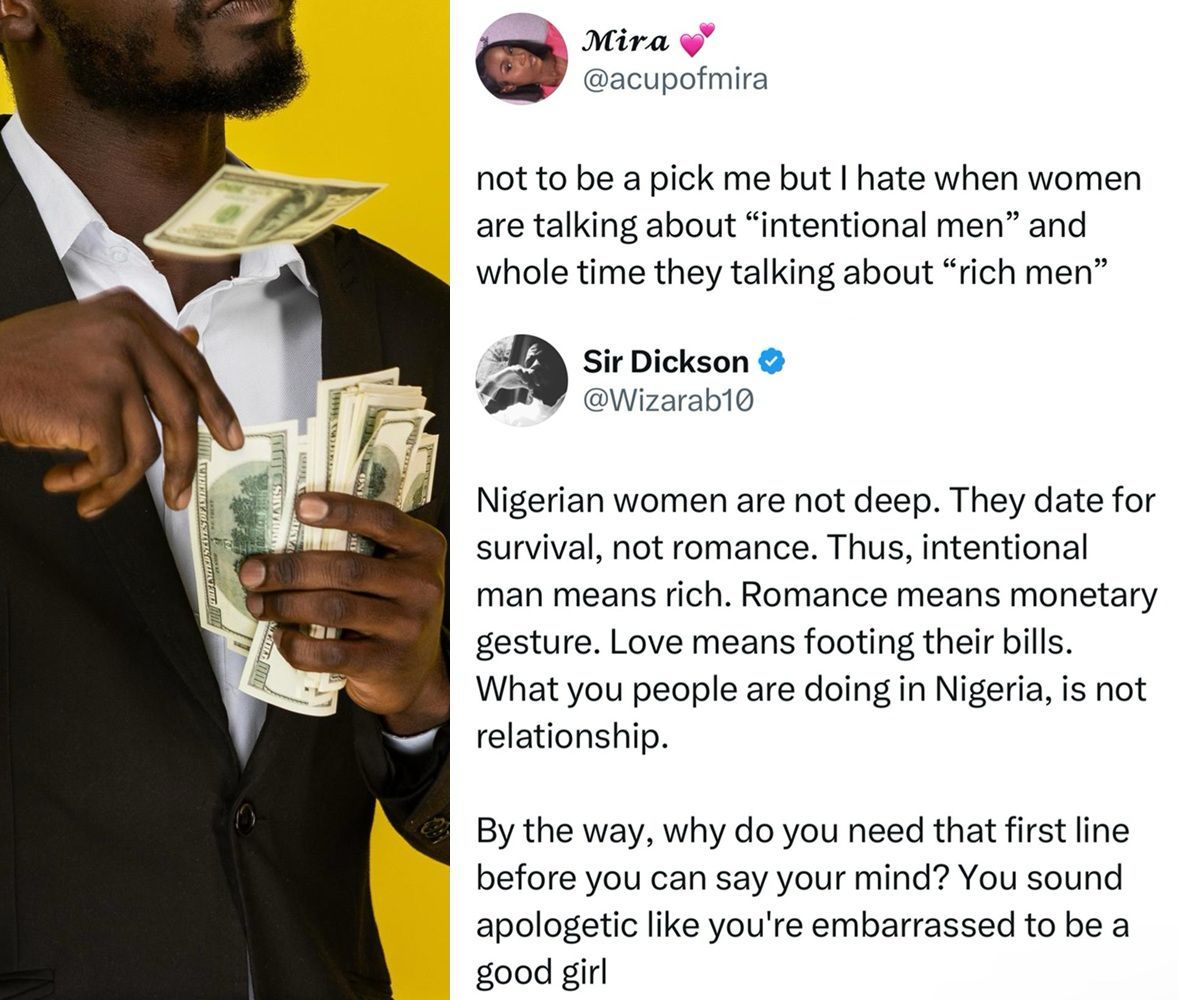
Is It Love or Survival? Viral Posts Spark Heated Debate Over Nigerian Women's Dating Culture

A fresh wave of controversy has erupted on social media after a viral post by a user known as @Wizarab10, also identified as Sir Dickson, boldly declared that “Nigerian women are not deep. They date for survival, not romance.” His tweet, which was sparked by an earlier comment from another user, @acupofmira, has ignited fierce conversations across Nigeria’s digital landscape, touching on issues of gender roles, financial expectations in relationships, and the evolving meaning of love in modern Nigerian society.
Mira’s original post read, “Not to be a pick me but I hate when women are talking about 'intentional men' and whole time they talking about 'rich men’,” suggesting a thinly veiled criticism of women who use coded language to describe their ideal partners. Her message struck a nerve, but it was Dickson’s blunt follow-up that stirred the hornet’s nest.
“Nigerian women are not deep,” he wrote. “They date for survival, not romance. Thus, intentional man means rich. Romance means monetary gesture. Love means footing their bills. What you people are doing in Nigeria, is not relationship.”
Dickson’s comments, laced with cynicism, quickly began trending, splitting public opinion down the middle. While some users applauded his frankness, others accused him of misogyny, ignorance, and unfair generalization. Screenshots of the tweet circulated widely, spawning countless rebuttals, think-pieces, and fiery threads.
Many women took offense at the implication that their relationships are purely transactional. One user, @ladyglow_, fired back, “Survival dating is a reality for many, but to say Nigerian women don’t understand love is both lazy and offensive. How many men in this country can date without offering financial support? Let’s be honest.”
Others echoed her sentiment, pointing out that the economic reality in Nigeria forces many women to prioritize financial stability in romantic partnerships. In a country with one of the highest rates of unemployment and inflation, especially among the youth, survival is often a primary concern. For some women, love cannot thrive without a degree of security.
Still, some commentators agreed with Dickson, describing a pervasive “soft life” mentality where relationships are seen more as opportunities for upward mobility than emotional connection. “He’s just saying the quiet part out loud,” tweeted @DebzTalks. “A lot of what’s labeled as 'intentional' is just code for rich. Let’s stop pretending.”
Mira herself returned to the conversation, clarifying her stance and defending the nuance of her tweet. “I wasn’t trying to shame anyone,” she wrote. “But it’s frustrating when conversations about emotional availability or real effort in relationships get hijacked by a fixation on money. We deserve both.”
At the heart of the debate is a complex intersection of gender, economics, and societal expectations. Nigeria’s patriarchal structure traditionally places the burden of financial responsibility on men, and in turn, rewards women who align themselves with partners who can provide. This dynamic, many argue, is neither new nor unique to Nigeria, but it is especially pronounced in a country where economic hardship is deeply entrenched.
Sociologists have long studied the concept of “romantic pragmatism” in African societies, where love is often intertwined with material security. In cultures where state support is minimal and opportunities are limited, the search for a financially stable partner can be a rational survival strategy. Critics of this system, however, warn that it erodes the essence of genuine connection and reduces relationships to transactions.
The issue is further complicated by the rise of social media, where curated lifestyles and luxury aesthetics often dominate, creating pressure to conform to certain standards of success and desirability. Many young Nigerians, influenced by global trends and local celebrity culture, now view financial capacity as a prerequisite for romantic worth.
But this doesn’t mean love is dead—or that Nigerian women, as a monolith, are incapable of deep emotional bonds. The outcry in response to Dickson’s post revealed a multitude of perspectives, many of which highlighted the emotional labor, loyalty, and commitment that women bring to their relationships despite financial constraints.
“We give, we care, we build,” wrote @omobolanle_. “To reduce all that to bills and gestures is not only unfair, it’s disrespectful.”
Others argued that both men and women in Nigeria have been socialized to see relationships through a financial lens. “If Nigerian men weren’t constantly judged by how much they earn, maybe Nigerian women wouldn’t be under pressure to find a rich man,” posted @truth_talker. “Let’s not pretend the pressure is one-sided.”
The debate has also prompted reflections on the language used in romantic discourse. Words like “intentional,” “provider,” and “romantic” are often loaded with double meanings that vary depending on context. What one woman sees as a romantic gesture, another may interpret as a sign of financial commitment. Similarly, the idea of a “good man” is often defined in monetary terms, reflecting deep-seated societal norms.
Despite the controversy, one thing is clear: Nigerian youths are increasingly willing to engage in uncomfortable conversations about love, money, and meaning. What began as a tweet has become a mirror, reflecting the evolving realities of modern relationships in a country where survival often shapes emotional choices.
In the end, perhaps what the conversation reveals is not a lack of depth, but a depth shaped by experience, struggle, and adaptation. Nigerian women—and men—are navigating a difficult terrain where emotions and economics are deeply entangled. And while some may date for survival, many still hope for something deeper: love that is both tender and secure, intentional and sincere.
Until then, the timeline remains ablaze.


